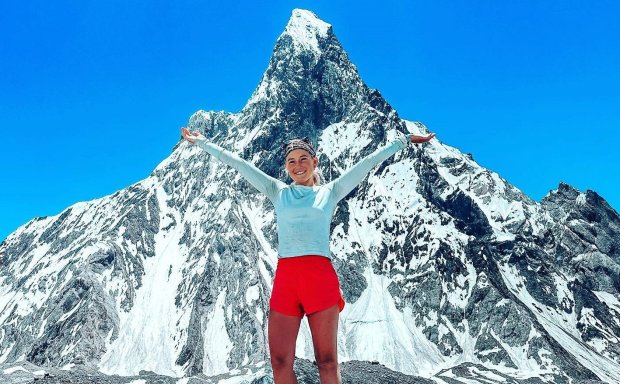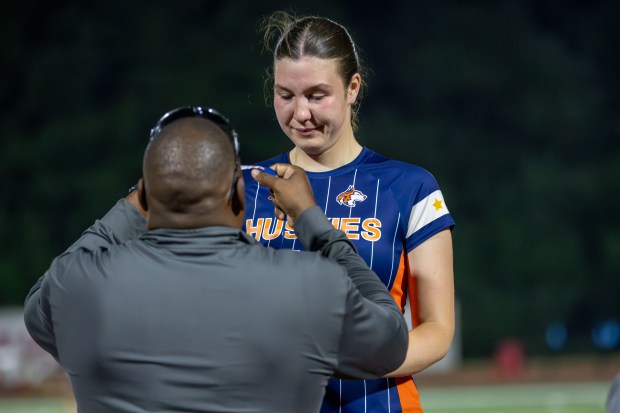For Naperville’s Lucy Westlake, trailblazing isn’t something she’d call a daily pastime. But the 21-year-old mountaineer’s trek — across the world, up the tallest peaks and lately, into new fields and onto a different kind of hill altogether — is making its mark.
On March 11, the DuPage County Board honored Westlake as part of a proclamation for Women’s History Month. The board commemorated the Naperville North High School graduate’s long — and growing — list of accolades, from being the youngest American woman to summit Mount Everest to these days interning for a U.S. representative on Capitol Hill.
“I never really see myself in this big leadership role in my day-to-day life but then (with things) like this, I’m like, wow, what I am doing does matter. It is inspiring people,” Westlake said.
Now a junior at the University of Southern California, Westlake has summited the tallest mountains on five of the seven continents and holds the record as the youngest female to summit the highest mountain in every U.S. state. She started mountaineering at age 7.
Speaking fresh off a spring break skiing trip to Colorado, Westlake has been in Washington, D.C., since mid-January. She’ll be staying through early May as part of a semester-long congressional internship. Westlake is one of 10 students from USC’s Price School of Public Policy making Capitol Hill their satellite campus this semester, she said.
Her days as an intern are spent helping a congressman’s office run smoothly, Westlake said, noting she couldn’t name whose office she was working in. Asked how the internship has been going so far, Westlake said it’s “definitely been a very crazy time to be in D.C.” but the experience has really allowed her to see the “ins and outs of government.” It’s also helped Westlake pinpoint where exactly she wants her career to go.
Though a public policy major, Westlake has recently been grappling with where she sees herself landing post-college, whether that’s working in government, the private sector, for a nonprofit or even a think tank, she says. Wherever she goes, though, what Westlake wants to do when she gets there is becoming increasingly clear.
Inspired by the places she’s been privy to through her expeditions, Westlake wants to pursue environmental research, she says. Namely, she wants to protect the world’s glaciers.
“Trying to create longevity in the mountains is what I would say my ultimate goal is,” Westlake said, “so that they will be there with their glaciers for generations to come.”
Climate change is accelerating the melting of the world’s mountain glaciers, according to a study published earlier this year in the journal Nature. The world’s glaciers lost ice at a rate of about 255 billion tons annually from 2000 to 2011, but that quickened to about 346 billion tons annually over the next decade, the study found. And the last few years the melt has accelerated even more, hitting a record 604 billion tons lost in 2023.
“These glaciers are disappearing,” Westlake said.
Lucy Westlake posted this photo of herself on Facebook in 2023 the day before she was to start the final leg of her climb up K2, the second highest mountain in the world. She was forced to abandon the trek after two avalanches made the trip too dangerous. (Naperville Sun file photo)
With research, Westlake hopes to gain a better understanding of what activities and factors are at the root of accelerated glacier melt so ultimately, “we actually create specific policies that can protect them rather than just having this big overall (goal of needing) to fix climate change,” she said.
True to form, she’s already chipping away at the aspiration.
Over the past few years, Westlake has started to weave research into her mountaineering by taking part in an initiative called “The Persistent Pollutants Project.”
Headed by Colorado-based glaciologist, mountaineer and educator Ulyana Horodyskyj Peña, the project strives to track and address pollutants found in ice and snowpack across the globe. Among those pollutants is black carbon, which is produced through the incomplete combustion of fossil fuels, biofuels and biomass, according to the Center for Climate and Energy Solutions, a Washington, D.C.-based environmental policy think tank.
Black carbon poses a particular threat to glaciers because when the material lands on ice and snow, it darkens the surface, making sunlight more easily absorbed, Peña says. In turn, ice and snow melts faster.
“The analogy I use is if you’re wearing a dark versus a light T-shirt out in the sun, right?” Peña said in a call Thursday. “When you wear a light one, you feel cooler. When you wear a darker one, you feel warmer.”
Peña wants to map where the greatest impacts of black carbon and other pollutants are being felt so that eventually “we can drive tangible solutions or even policy changes,” she said. But first, she needs the data. That’s where Westlake comes in.
Westlake has been helping collect snow and ice samples from the field for Peña to study. She collected her first samples for Peña’s research when she attempted to summit K2, the world’s second-highest mountain in northern Pakistan, in 2023.
“Since then, every mountain I’ve been on, I’ve just collected samples for her and sent that back so she could analyze them,” Westlake said.
Westlake’s input is especially valuable because she’s been able to supply physical samples from remote regions that aren’t as easily accessible for study, Peña said.
“If you visualize a map of the planet and where all of the samples have been collected, there’s still a lot of gaps … so the more data we have, the more comprehensive picture we really see unfolding of that pollution spread,” Peña said.
All the while, Westlake has discovered her own passion for the work.
“I’m really happy that my skills are being used for a bigger cause,” she said. “That’s something I definitely want to continue (to do). And I’m trying to grow my skill set so I can be of more help on the research end as well, not just the collection end.”
Westlake plans to do just that later this year.
After her semester in D.C., Westlake will be delving further into her partnership with Peña by traveling to Washington state for the summer, where she’ll be collecting snow and ice samples on Mount Rainier and Mount Baker. After sending the samples to Peña, the idea is that she will return to USC where she’ll take the data that Peña amasses and synthesize it from an analytics perspective, Westlake said. The venture will be made possible through a scholarship Westlake secured through USC.
While in Washington, Westlake will also be working. She has a summer job, aptly, leading ascents as a mountain guide.
The Associated Press contributed.




